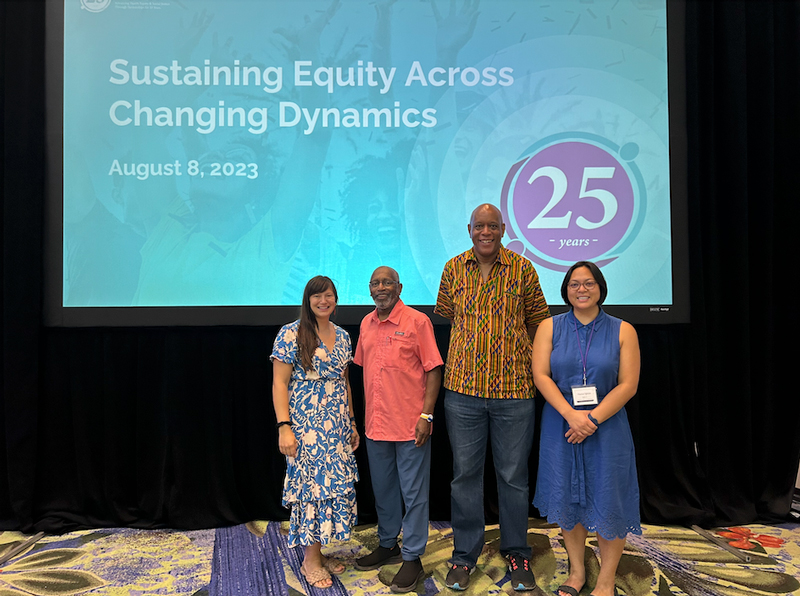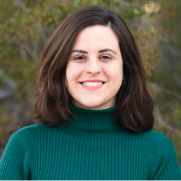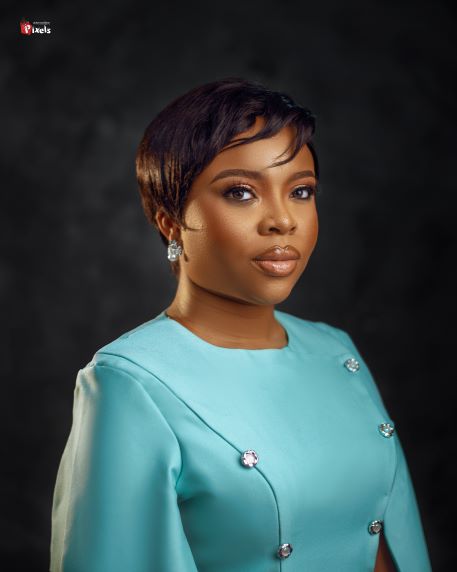This is the second post of our Let’s Talk Academia, Industry, and Career Transitions. In this special edition of the DRC Talk Series, we chat with professionals in Rhetoric and Composition or Technical and Professional Communication who have successfully transitioned beyond academia. Our goal is to learn from their experiences and gather practical advice and resources for graduate students and early career scholars exploring similar paths.
Thais Rodrigues Cons (1st author) Toluwani Odedeyi (2nd author)
When Dr. Charisse Iglesias joined the Zoom meeting with Toluwani and I, there was a sense of connection right away, not just because she’s an alumna of the same program I’m currently in at the University of Arizona, but also because I look up to her work. As a technical communicator and intersectional feminist, Charisse embodies some of the best values in writing studies, such as social justice, community engagement, and reflective practice.
Our chat was relaxed and full of insights as she narrated her career transitions, highlights and advice. Dr. Iglesias is an example of how academic experiences translate into industry roles— especially when those are meaningful to one’s interests. In her case, all paths led to community partnerships.
From the Peace Corps and Wildcat Writers to Public Health
Charisse began her community engagement story through the Peace Corps as an English educator in Indonesia. She grew passionate about community partnerships that leverage privileged, academic resources to benefit communities. She saw the power in valuing local knowledge: “Instead of academics going into the community and being like, here’s what I think your problem is… it’s a collaboration” of ideas, assets, and expertise to achieve shared goals.
Her commitment to community brought her to the University of Arizona’s RCTE (Rhetoric, Composition, and the Teaching of English), being particularly drawn to the Wildcat Writers program (WW). WW is a longstanding partnership between university instructors and teaching in local high schools through writing projects. “I just loved the program so much,” she recalls, mentioning how WW allowed both academic and high school partners to “feel free to play and explore” while still “achieving milestones.”
Reflecting on her tenure at Wildcat Writers, first as an instructor, then as a researcher and Assistant Director, Charisse credits much of her professional ethos to the mentorship she experienced working with Drs. Adele Leon, Rachael Shah, and Stephanie Troutman Robbins. Those relationships allowed her to develop as a leader and community-engaged scholar.
Her doctoral program wasn’t linear, nor did she have a prescriptive plan from the start: “I really believe in organic shifts,” she told us, “I didn’t know anything about public health.” “Later, her path would lead her to explore community engagement in her dissertation.
Her dissertation, Reciprocity Across Communities, directly confronts the missteps of non-reciprocal engagement in global and local contexts. A key method in her project is composing multimodal, reflective comics: “It’s an indirect strategy of dealing with difficult feelings because the process redirects the focus on the artwork rather than on myself.” Through this visual work, she can step back, “see the whole picture,” and connect past choices to present-day advocacy. Some of her incredible work with comics and Wildcat Writers can also be seen in her article Composing Reciprocity with Comics: Composing the Labor in Community-University Partnerships, co-authored with her Wildcat Writers partner, Maxwell Irving.
Day-to-Day Life as a Training and Resource Director


Today, Dr. Iglesias serves as the Training and Resource Director at Community-Campus Partnerships for Health (CCPH). Her role is inherently collaborative, as she manages multiple communication with diverse teams- marketing, evaluation, translation services, and public health practitioners. A typical day might include checking Slack, emails, and project boards like Asana, coordinating virtual events “from pre-production to post,” and managing contracts, panelists, and logistics. She also co-develops public-facing resources, such as a dissemination toolkit for clinical researchers. “That’s kind of our niche,” she explained, training “academics that authentic partnership with patients and community members improves outcomes—but it takes emotional and financial labor.”
Charisse’s current job draws on key principles from her community engaged scholarship that started in the Peace Corps and Wildcat Writers. “Cultural humility and trust-building” are the two core principles she emphasized to be essential when working with historically marginalized communities. “Black and brown communities and Indigenous communities already have so much harm, historical harm and current harm done to them by clinicians, by researchers,” she explained.“ There’s a lot of mistrust in the government and in research and universities.” While these values may seem straightforward, she described them as difficult to implement, especially in research spaces still steeped in systemic inequities.
Translating Academic Experiences: advice for students and programs
Throughout our conversation, Dr. Iglesias frequently returned to the idea of “transferable skills”. Reflecting on experiences like Wildcat Writers and the Southern Arizona Writing Project, she recognized how these community-oriented initiatives were valuable. “My work now is about promoting social justice and health equity through partnerships,” she explained, “and that came directly from those early projects”.
Charisse was refreshingly candid about the contrasts between academia and industry, especially considering hidden-curriculum academic expectations. She advises current students to intentionally translate CV-based accomplishments into concise, impactful resume entries that resonate with industry professionals: “You need numbers, quick snapshots of your impact. You have to reframe and distill all your years of work into two well curated pages that a recruiter will look at for seconds”.
She advocated for earlier, structured exposure to industry possibilities through workshops and hands-on exploration within academic curricula. “It’s not about saying ‘forget academia,’” she clarified, “but painting a broader picture for your students. Most people won’t get a tenure-track job, and even if they do, that doesn’t mean it aligns with their values or needs.” For Charisse, graduate programs need to integrate industry-facing alternatives from day one as a component of professional development and mentorship.
Her suggestions also included conducting informational interviews and reaching out to professionals via LinkedIn—researching people with career paths you admire and asking about their experiences. Charisse embraced this while on the job market, having dozens of 15 to 20 minute chats. “It was embarrassing at first, but it helped me understand how to make my dissertation and my skills more relevant for the jobs I was actually interested in.” Dr. Iglesias also highlighted learning practical industry tools early on—project management software, clear and succinct email communication, and familiarity with platforms like Salesforce and Asana.
When asked about the future of digital rhetoric and technical communication in professional contexts, Charisse emphasized the need for rhetoricians to “spread out more”. Writing scholars need to advocate for clarity, accessibility, and direct engagement with communities beyond academic circles. She believes our field has immense potential to influence other industries meaningfully, especially through ethical and inclusive communication practices.
Some additional resources
Charisse recommended resources that made an impact on her own professional development, which might be helpful for students considering a similar transition:
- Beyond Academia at UC Berkeley: Conferences and workshops on resume writing, job market preparation, and career trajectories for humanities, social science, and STEM scholars.
- ACLS Leading Edge Fellowship: An excellent opportunity for humanities scholars looking to transition into industry roles through socially engaged work.
- Next-Gen Perspectives on Leadership (forthcoming, Utah State University Press): Edited by Charles McMartin, Eric House, Sonia Arellano, and Thomas Miller, this volume includes Charisse’s own chapter “Navigating Industry Careers through Cultural Integration”, where she writes about transitioning from academia to industry through a lens of cultural integration and community engagement.
As our conversation ended, Charisse left us with a powerful reminder: moving from academia to industry—much like cultural integration—is a nonlinear, reflective process: “Just like when you enter a new culture, you don’t just pop in and say, ‘Hey folks, what’s up?’ You observe, you model. It’s ongoing.” Patience, flexibility, and openness to uncertainty are also transferable skills to be built along the way.
We are grateful for Dr. Iglesias’ time and generosity in sharing her lived experience with our DRC community, and we hope to keep learning from her scholarship.


